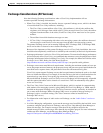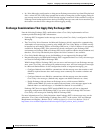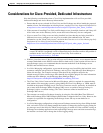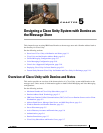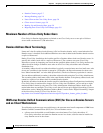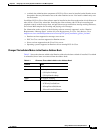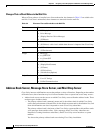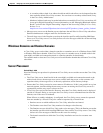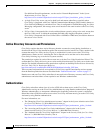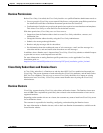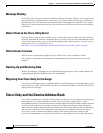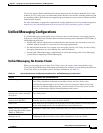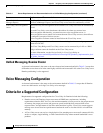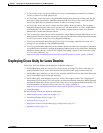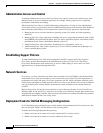
5-5
Design Guide for Cisco Unity Release 5.x
OL-14619-01
Chapter 5 Designing a Cisco Unity System with Domino as the Message Store
Overview of Cisco Unity with Domino and Notes
–
A secondary address book is an address book from which subscribers can be imported but that
does not home default Cisco
Unity accounts. You can choose a secondary address book, if any,
in the Cisco
Unity Administrator.
–
Monitored address books may be needed when there are multiple Cisco Unity servers that will
be set up for Digital Networking. For more information, see the “Managing Monitored Address
Books” section in the “Digital Networking” chapter of the Networking Guide for Cisco
Unity
Release 5.x at
http://www.cisco.com/en/US/products/sw/voicesw/ps2237/products_feature_guides_list.html.
• Message store servers are the Domino servers that home the mail files for Cisco Unity subscribers.
Domino administrators configure mail files for Domino users.
• The mail drop server is the Domino server that the installer specifies while installing IBM Lotus
Notes on a Cisco
Unity server. Cisco Unity delivers all voice messages to Mail.box on the mail drop
server for routing.
Windows Domains and Domino Domains
A Cisco Unity server can be either a domain controller or a member server in a Windows Server 2003
or Windows 2000 Server domain. If the Cisco
Unity server is a member server, it should reside in the
same highly available and connected network as a domain controller for that domain.
The customer needs at least one Cisco Unity server for each Domino domain that will home Cisco Unity
subscribers.
Server Placement
Revised May 6, 2008
Note the following best practices for placement of Cisco Unity servers and the servers that Cisco Unity
relies on:
• The Cisco Unity server should reside in the same highly available and connected network as the
address book servers, the message store servers, and the mail drop server, or the customer will
experience delays in message access, in directory replication, and in directory lookups.
• Ensure that Cisco Unity can resolve server names to IP addresses. If this is not possible on a given
network segment, consider adding the necessary resource or moving the Cisco
Unity server to a
segment that provides easy access to these services.
• Cisco Unity can coexist with firewalls. However, note that Cisco Unity should never be deployed
outside of a firewall. Doing so can expose the Cisco
Unity server to unwanted intrusion from the
Internet, even if the server is hardened.
When failover or standby redundancy is configured, the Cisco Unity servers cannot be separated
from one another by a firewall. They also cannot be separated by a firewall from:
–
Domino servers on which mailboxes for Cisco Unity subscribers are homed.
–
The Domino server that Cisco Unity monitors for changes to the directory.
–
The Domino server to which Cisco Unity sends voice messages. (This is the Domino server that
the installer specifies while installing IBM Lotus Notes on the Cisco
Unity server. Cisco Unity
delivers all voice messages to Mail.box on this server for routing.)
–
The domain controller on which the Cisco Unity installation and services accounts were
created.



